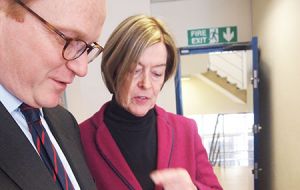MercoPress. South Atlantic News Agency
Falklands' Museum incorporates naval journal with accounts of Port Egmont 250 year ago
 Alexandra Shackleton and FIMA Friends legal advisor and member Tom Murdoch. (Pic. G. Bound)
Alexandra Shackleton and FIMA Friends legal advisor and member Tom Murdoch. (Pic. G. Bound) Two hundred and fifty years on, the story of a bold Falklands naval adventure has been purchased for the local museum in Stanley. Friends of the Falkland Islands Museum and Jane Cameron National Archives (FIMA Friends) executive committee member Alexandra ‘Zaz’ Shackleton was browsing at the regular antiquarian travel book fair at the Royal Geographical Society in London, when she came across a volume that she immediately knew belonged in the Falklands.
The slim and well preserved book, of which few copies were printed and even fewer survive, is a first edition of a journal written by naval officer Bernard Penrose, who was surgeon’s mate aboard His Majesty’s Shallop Penguin, which was based at Port Egmont on Saunders Islands just over 250 years ago.
With the wordy title ‘An Account of the Late Expedition to Port Egmont in the Falkland Islands in the Year 1772’, Penrose gives a fascinating description of the Islands during one of the most volatile periods in the Islands’ history.
Penguin was a small prefabricated armed sailing vessel which was carried to Port Egmont aboard the much larger and much more famous ship HMS Endeavour. Endeavour had carried Captain James Cook on his famous voyage of discovery to Australia and the South Pacific, but by 1772 she was shuttling to and from the Falklands, supporting the garrison at Pt Egmont.
Once assembled and armed with cannon, HMS Penguin patrolled and explored the Islands, under the command of Lieutenant SW Clayton.
Just three years earlier in 1769, British and Spanish ships had unexpectedly encountered each other while both forces were surveying the Islands. Each force formally accused the other of having no right to be there before going on their way.
The next year, five Spanish ships arrived off Pt Egmont, and the British were forced to briefly abandon their base. As a result, war seemed likely until the two countries hammered out an agreement effectively allowing the Spanish to remain at what is now Port Louis, while the British maintained their colony at Saunders Island.
The little warship Penguin patrolled and explored the British held territory for two years until she was again dissembled and shipped back to Britain aboard HMS Endeavour. Port Egmont was abandoned in 1774, as London committed itself fully to the American War of Independence, and ended as many other military operations as possible.
Notified of the find by Zaz Shackleton, the Friends Committee contacted Andrea Barlow at the Falklands' Museum, who said the museum would be delighted to add the book to its collection. Penrose’s account of early seafaring in the Falklands was bought by FIMA for approximately £1,000 and will be taken to Stanley soon. (Penguin News)
By Graham Bound - London




Top Comments
Disclaimer & comment rules-

-

-

Read all commentsI am not getting involved in a slanging match, but I have never currently heard of Bute being in the Western Isles...similarly with Arran and the Cumbraes.
Aug 19th, 2017 - 01:03 pm +7They are known as the Clyde islands. Yes, they were described as the Western Isles about 5 centuries ago but that has long disappeared from use.
I am sure the expression now means the Outer and Inner Hebrides.
You appear to know very little. I suggest that you do some research.
Aug 19th, 2017 - 01:10 am +6The 1771 Convention refers to West Falkland (Great Malouine) - NOT Saunders island.
“... his Catholick Majesty engages to give immediate orders, that things shall be restored in the Great Malouine at the port called Egmont, precisely to the state in which they were before the 10th of June, 1770:..”
And no, we did not 'fuck off' - we withdrew a garrison, nothing more.
“Be it known to all Nations, That Falkland's Island with this Fort, the Storehouses,
Wharfs Harbours, Bays and Creeks thereunto belonging, are the sole Right and
Property of his Most Sacred Majesty George the third, King of Great Britain,
France and Ireland, Defender of the Faith, etc. In Witness whereof this Plate is set
up and his Britanick Majesty's Colours left flying as a mark of possession by S. W.
Clayton, commanding officer at Falkland's Island. 1774 A.D.”
December 4th, 1789
“... it may justly be concluded that the Government of this country has never acknowledged any Right in the Crown of Spain to the Sovereignty of these Islands or relinquished any Claim we may have to them. ”
[TNA BT 5/5 at 424.]
And that's it :-)
Still all gob Voice.
Wrong again Voice. Spain was on the back-foot as France wouldn't support the notion of going to war - so Britain dictated the terms.
Aug 18th, 2017 - 11:20 pm +5Much the same as 1790 in fact. Spain has so much to thank France for.
Commenting for this story is now closed.
If you have a Facebook account, become a fan and comment on our Facebook Page!